April 9th, 2009
Rehashes of Time
To my deep dissatisfaction, I missed seeing Ashes of Time Redux on the big screen when it was shown at one of the arthouse theatres here in Santa Cruz. In fact, the damn thing lasted all of ONE WEEK, a turn of events which proved hugely disappointing to me when I looked up showtimes online only to find that the film had been replaced with some piece of crap indie flick. Thankfully, Ashes of Time Redux eventually made its way to DVD on March 3, 2009, and I was pretty stoked on seeing it from the comfort of my own home.
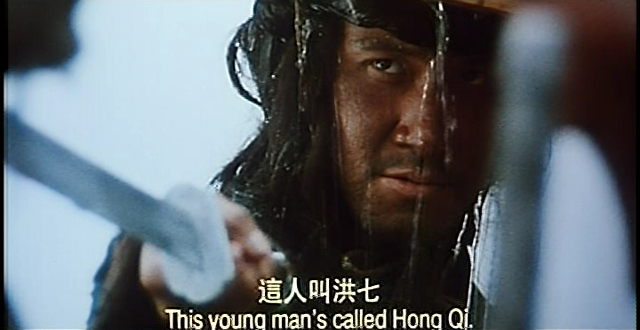
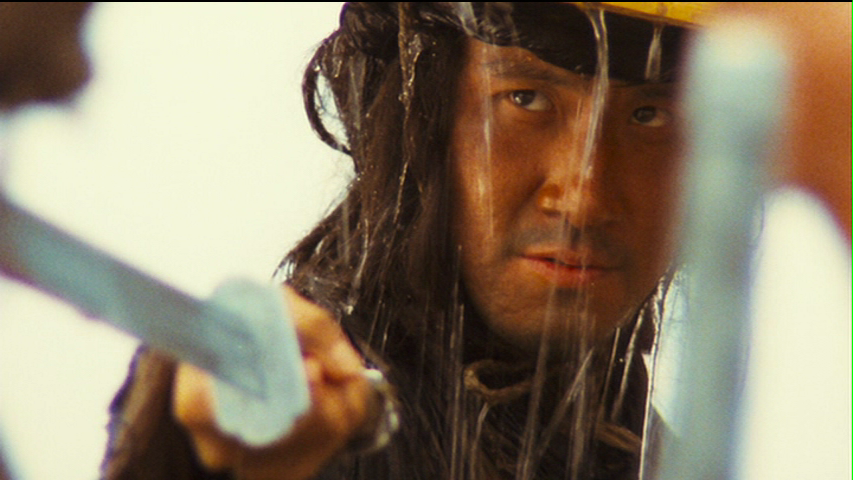
Ashes of Time (left), Ashes of Time Redux (right)
However, in the midst of a sea of essays to grade, term papers to write, and various assorted responsibilities to attend to, I postponed a viewing of Wong Kar-Wai’s re-edit until my Spring Break vacation. I had the full intention of reviewing the movie for LoveHKFilm.com, but as fate would have it, Kozo beat me to the punch. In some ways, this actually turned out to be a good thing. For one, I agree with pretty much everything Kozo said in his very well-written and insightful review, so it’s not like I had something better to contribute. And two, as I tried to compose my thoughts on the film, I realized that reviewing a restored and/or re-edited film – rather than a wholly original work – is, in some ways, a thankless task. Basically, even if you try to review the film on its own merits, one’s critique eventually breaks down into an exercise in “contrast and compare.” And really, isn’t that what fans of the original movie actually want – What’s different about the new movie? What’s cut out? Did he put anything in? Did Wong Kar-Wai ruin his own movie?
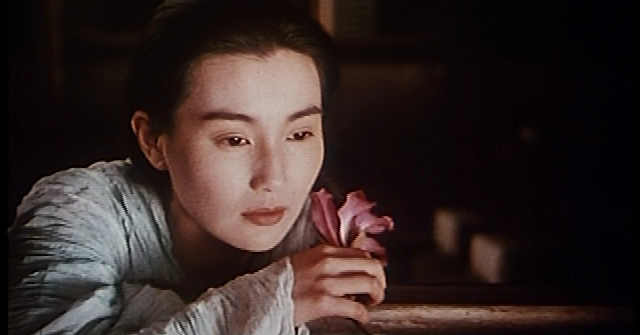
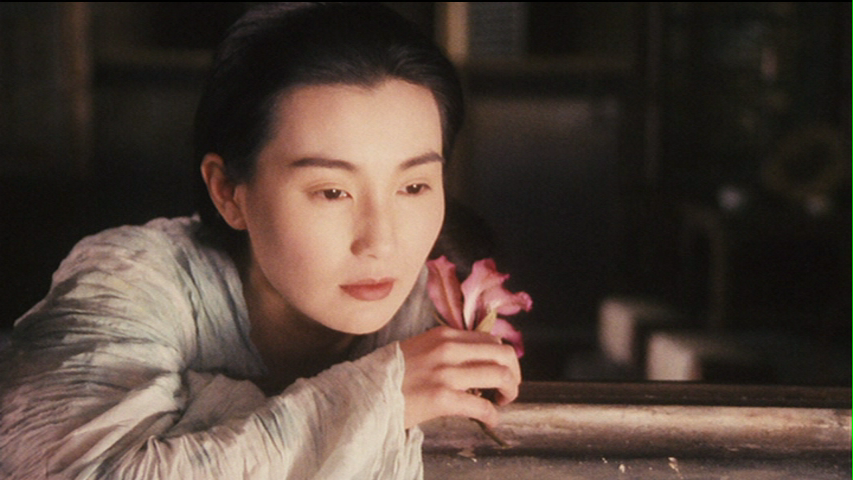
Ashes of Time (left), Ashes of Time Redux (Right)
In a lot of ways, these pressing concerns make a discussion of Ashes of Time Redux more suitable to the blog format, in the sense that a) I don’t necessarily have to be as focused as I would be in a review, b) I can post screen captures for comparison, c) I can talk about the film in a way that might not be appropriate for the review format, and d) I can make more jokes.
So, where to begin? Well, when I first heard about Ashes of Time (1994) way back when, a lot of the reviews that I encountered said that it was confusing, convoluted, and even pretentious. Granted, these reviewers seemed to be solely enamored with films focusing on kung fu, gun battles, and/or naked chicks, so in hindsight, they weren’t necessarily Wong Kar-Wai’s target demographic. Not knowing much about Hong Kong cinema at the time, I sorta believed these critics and held off watching the film. It took seeing Chungking Express for me to decide to seek out this film. And when I finally saw Ashes of Time on DVD, I had a decidedly different reaction than those so-called HK film fanboys. I loved it. Instead of being confused, I found the movie to be rather straightforward – I mean, it has voiceover narration for crying out loud! And as far as I can tell, the motives of all the characters are revealed either immediately through voiceover or gradually to complement the rhythm and structure of the film. What’s confusing about that? The only things that are potentially puzzling are the Sammo Hung-choreographed fights that begin and end the movie. Remember Leslie Cheung battling Lau Shun in a barn towards the beginning? Or Leslie duking it out with Jacky Cheung toward the end? Well, for the Redux, Wong Kar-Wai decided to delete both of those scenes, and quite a few others. Is that a good thing? Well, that depends on your attachment to these and other scenes, I suppose.
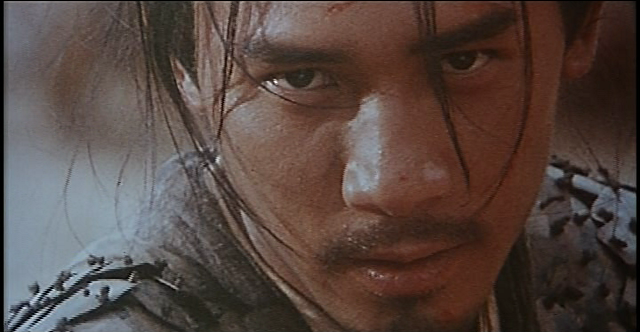
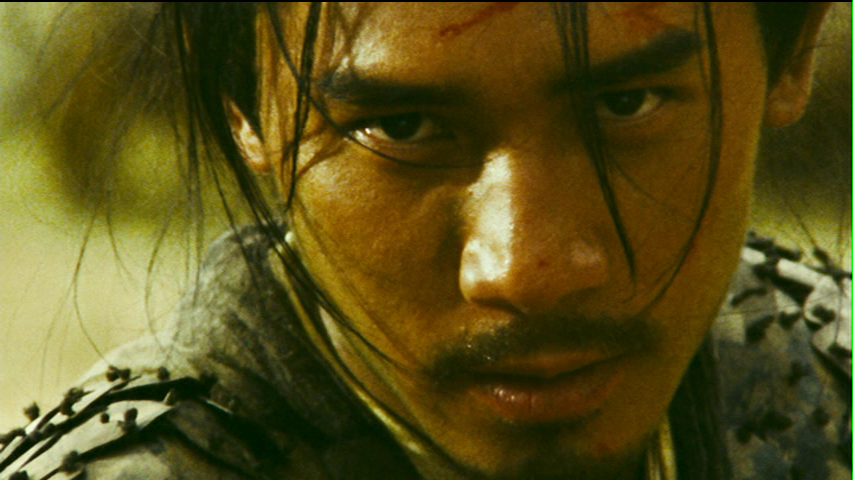
Ashes of Time (left), Ashes of Time Redux (right)
Hold the Cheese
For me, Ashes of Time Redux is a cleaner, prettier, and more tonally consistent film than its already wonderful 1994 predecessor. With a restored and reworked color palette, Ashes of Time Redux could fit right alongside not just In the Mood for Love and 2046, but more contemporary wuxia films in the post-Crouching Tiger, Hidden Dragon/Hero era. In other words, it no longer resembles a Ching Siu-Tung or Tsui Hark film from the early 1990s. In some ways, I suppose that’s a real shame for more than a few viewers, but overall, I think the film is better served for it. Is it a better film? Hard to say.
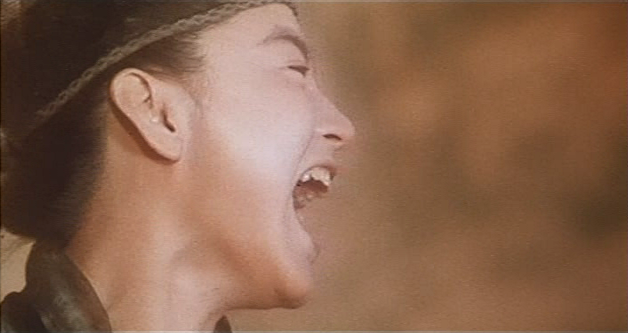
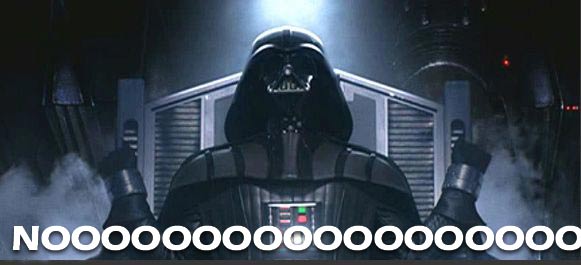
Edward Munch would be soo proud.
Aside from tweaking the colors and the image, Wong Kar-Wai’s main goal seems to be lowering the film’s cheese factor. Remember Brigitte Lin’s cheesy as hell double scream on the lake? Well, it’s gone, and I don’t think anything was lost by its deletion. It wasn’t out of place in the era of Swordsman II and the like, but now, the scream has the same effect as Darth Vader’s “Nooo!” in Revenge of the Sith – it’s ridiculous and takes you completely out of the movie. Lin fans might mourn the loss of her precious screen time, but I doubt others will.
Remixed, but not by Timbaland
As most know, Frankie Chan and Roel A. Garcia’s synthesizer score has gone full orchestral thanks to the contributions of composer Wu Tong and cellist Yo-Yo Ma. I have to say, that I did not rewatch the original Ashes of Time in its entirety immediately before/after watching the Redux. For what it’s worth, I did, however, fast forward through the whole thing, stopping only to compare certain scenes. While this fact disqualifies me in giving a proper critique of the music change, I can report some off-the-cuff thoughts on the difference. First of all, the new soundtrack didn’t suck, and I know this because it never felt distracting or lightweight. I remember the original score as bombastic, and the new version follows suit at all the appropriate times as far as I can tell. However, during the few scenes of the original that I did stop to watch, I was struck by the fact that the original score often felt antiquated, distracting, or just plain cheesy. Thus, I would hesitantly say that there’s nothing wrong with the more respectable sounding Redux soundtrack. I’m not saying it’s better since I didn’t compare it note-for-note. It just doesn’t suck.
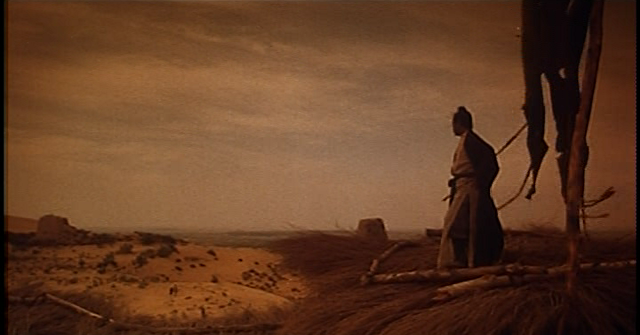
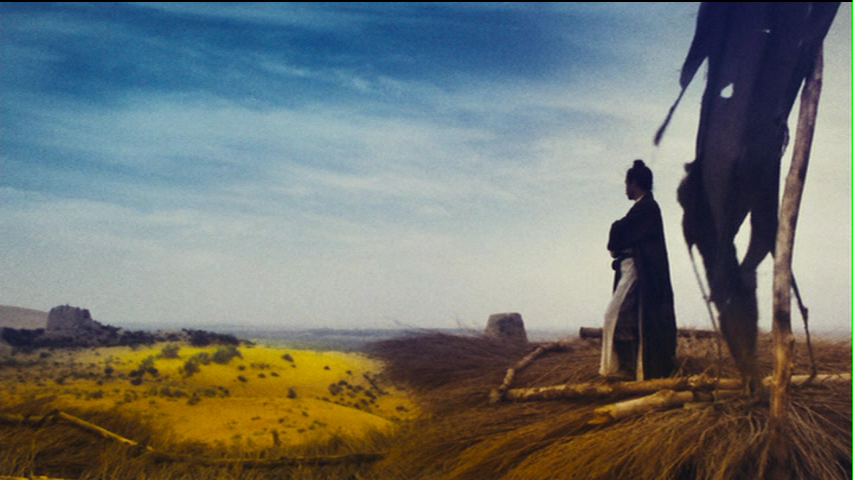
Ashes of Time (left), Ashes of Time Redux (right)
The Cruelest Cut
Imagine for a second if Wong Kar-Wai decided to do Days of Being Wild Redux. Really, aside from some changes in the color palette, I’d imagine he’d only delete one scene – Tony Leung’s cameo at the end of the film. For those in the know, that was supposed to lead into the aborted Days of Being Wild sequel, footage of which I would love to see someday if it still exists. But for those going in to the movie cold, that scene makes absolutely no sense whatsoever. By all rights, the film should’ve ended with the sound of the phone ringing in that empty telephone booth before cutting to black. That would have been an awesome final moment if WKW had chosen to do it that way, perfectly visualizing one of his pet themes — love is all a matter of timing. Now, would I recommend Wong Kar-Wai actually go back and recut the film to suit my whims? Well, I’m not sure. Even though it’s completely baffling in context, I’m strangely partial to the Tony Leung scene because a) I know it exists so I’d always be bothered by its absence if it were cut out b) I like Tony Leung and it was nice to see him, even for only a couple minutes, and c) if he stays in the film, I can keep pretending that he’s playing a young Chow Mo-Wan from In the Mood for Love and 2046. For me, that little scene — despite kind of screwing up the movie’s perfect rhythm and confusing the hell out of audiences, particularly non-Chinese — suggests that there exists a movie that is beyond the movie that we just watched, and we’ll likely never see it.
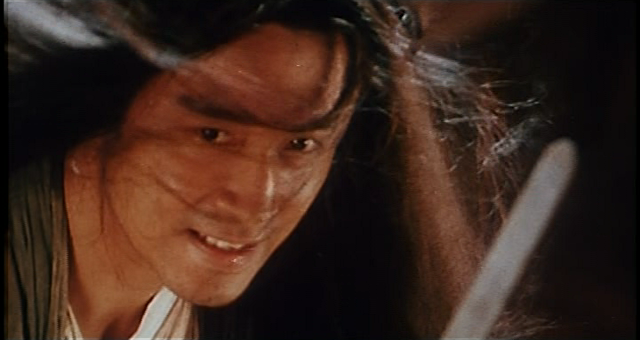
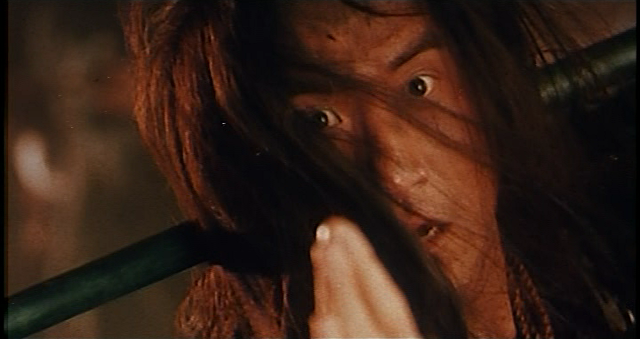
Movie within a Movie: Ashes of Time 2: Legend of the Condor Heroes
Having said all that, I sort of view the fight scenes at the beginning and end of Ashes of Time in a similar vein. As most know, the film is meant as a kind of prequel to Jin Yong’s novel Eagle Shooting Heroes (not to be confused with Jeff Lau’s parody) in which WKW speculates on what could have possibly led Huang Yaoshi and Ouyang Feng to become the very, very bad men that they are in the original novel. What I liked about the two fight scenes is that they basically showed you a window into the future, a window into what I presume to be key events in The Eagle Shooting Heroes. I don’t know for sure because I’ve never read the damn thing, but it certainly feels like it’s possible. Now I don’t really mind that the scene with Lau Shun was cut (although I’m curious if he was supposed to be someone important), but while watching the Redux, I really missed the moment in which Hong Qi (Jacky Cheung) recognizes that the man he has been fighting was his “friend,” a now malevolent-looking Ouyang Feng (Leslie Cheung). Certainly, this is covered in the Chinese text that concludes Hong Qi’s story in the body of the film, but actually seeing a glimpse of that encounter – in some ways, a glimpse of a film that doesn’t exist– was really cool. So, while the movie might be tighter due to this deletion, I do miss that little indulgence.
Watching at Home
Aside from having an image of a Japanese katana(!) on the disc, the Ashes of Time Redux DVD is pretty nice, as there are two really interesting extras: 1) Born From The Ashes: The Making Of Ashes Of Time Redux, which has interviews with Wong Kar-Wai, Christopher Doyle, Tony Leung, Charlie Yeung, and Carina Lau, and b) a rather long interview with Wong Kar-Wai conducted by J. Hoberman of the Village Voice, which is pretty interesting. There’s also a trailer for the Redux.
Now I don’t know how much money Sony is willing to spend on the eventual Blu-Ray release, but I would hope that they might include all these extras, plus an original Hong Kong trailer, maybe a slightly longer documentary, and would it be too much to have the original Ashes of Time included? I wouldn’t mind even if it was the print used for the Mei Ah version with burned-in subtitles. It would just be good for archival purposes. If not, how about some (remastered!) deleted scenes with optional diretor commentary? It’s just a thought.
Anyway, that’s my two cents on Ashes of Time Redux. What did you think about the new movie?


April 9th, 2009 at 8:06 pm
wow, youre doing a huge disservice to the original ashes of time by just skimming it and then comparing it to redux. to me, ashes of time the original is superior in almost every way except for the pixelated vcd version i watched it on. the bombastic score matches the existential dilemma of the characters perfectly. this is a huge point as the changed minimalist score of yo yo ma has now changed the coloring of the scenes. where before we felt the inner turmoil of the characters, now we’re left to draw our own conclusions. but when you have a wuxia epic with characters in love triangles, everything about the film says it should be epic — music, too. too often we are kept at a distance. moreover, the new soundtrack pieces aren’t very catchy. it’s pretty but it doesn’t pull you into the story. often, i wondered why i was hearing it and the sound design was at times intrusive especially in the bridgette lin leslie cheung scene in the cave.
i actually think the latter movies from wkw’s canon beginning with in the mood for love (yes, i said it) have suffered from this similar lack of energy and life. while i appreciate in the mood for love, the latter two - blueberry nights and 2046 - seem rehashed and sterile. this is the same for redux.
at first i thought i’d agree with this review when you said the original made sense story wise but then you make a u-turn and say how redux is better. to me, i think the confusion caused by the original is far more effective dramatically than the new one. crucial story is revealed when it can produce the most effect - like when leslie visits carrie lau. cant remember whathappened in the redux but i think it was separate from leslie’s narrative growth sequence which made it come off as unnecessary.
im stream of thoughting this now and again with the music and carrie lau when she’s on the horse, before it was very sensual as she engaged in touching the horse as she thought of her lover but with the new minimalist score i felt like an observer peeping through instead of being with her.
anyway i suggest you watch the original in its entirety and at 1x before you make any review comparing the two. quite offended actually that you’d attempt to do so.
April 9th, 2009 at 9:50 pm
Finally! Someone else who didn’t find Ashes of Time’s narrative confusing. It’s really not that hard if you follow the individual characters instead of looking for some overarching “plot” or “meaning.”
I personally missed the excised fight scenes - as short as they were, they contained action and beauty that I would’ve liked to see on the big screen, not to mention proving that Ouyang Feng is, in fact, the man.
April 9th, 2009 at 10:22 pm
Whoa, Mike, take a breath. You’re actually “offended”? Really? You should re-read my post carefully before accusing me of doing a disservice to the original film. This isn’t a proper review — if it were, it would be listed alongside Kozo’s in the main site, and nowhere in my post do I say that I’m attempting to do a scene-by-scene comparison. I’ve seen ASHES OF TIME at least a dozen times, and I actually call it a masterpiece in the blogroll link to this article. I specifically say that me not properly rewatching the film “disqualifies me in giving a proper critique of the music change.” The BEST thing I say about the music is that it doesn’t suck, it’s “respectable,” and there’s nothing really wrong with it. I don’t say that it’s necessarily BETTER; it’s just not a disaster. Even if the original score WAS better as a lot of purists seem to believe, the new music didn’t bother me one bit, and thus wasn’t a dealbreaker. Since I liked the movie as a whole, I didn’t need to compare the two scores nor did I wish to.
To be clear, I’m not even saying the REDUX is a better film, but I do like it. Again, I may say that it is “cleaner, prettier, and more tonally consistent film than its already wonderful 1994 predecessor,” but do I prefer it? Not necessarily. There are some changes I like, and some changes I don’t. The whole comparison between DAYS OF BEING WILD and ASHES OF TIME was meant to illustrate that. Logically, if there was a DAYS OF BEING WILD REDUX, the scene with Tony Leung should be cut since it introduces a new character with a minute or two remaining in the film, but if Wong Kar-Wai actually went back and cut Tony out of the picture, I’d probably miss it. And that’s kinda the point with ASHES OF TIME REDUX — Wong Kar-Wai has arguably made a tighter film, but in some ways, something was lost in the process. Still, I can appreciate this new cut for what it’s trying to do and what it accomplishes. For me, it remains a great movie; it’s just different.
April 10th, 2009 at 1:22 am
i guess i missed the part where you said you watched it a dozen times though i did catch that you said you watched it and loved it. it baffled me when you said this:
For me, Ashes of Time Redux is a cleaner, prettier, and more tonally consistent film than its already wonderful 1994 predecessor. With a restored and reworked color palette, Ashes of Time Redux could fit right alongside not just In the Mood for Love and 2046, but more contemporary wuxia films in the post-Crouching Tiger, Hidden Dragon/Hero era. In other words, it no longer resembles a Ching Siu-Tung or Tsui Hark film from the early 1990s. In some ways, I suppose that’s a real shame for more than a few viewers, but overall, I think the film is better served for it.
upon rereading it, it sounds like you’re making more of a comparison of the picture quality. the word “tonally” can also mean story tone and since in the mood for love and 2046 also have significant STORY tonal changes from his earlier canon (less kinetic) i thought you were speaking of that.
but this is the one part of your post that i vehemently disagree with:
“I remember the original score as bombastic, and the new version follows suit at all the appropriate times as far as I can tell. However, during the few scenes of the original that I did stop to watch, I was struck by the fact that the original score often felt antiquated, distracting, or just plain cheesy. Thus, I would hesitantly say that there’s nothing wrong with the more respectable sounding Redux soundtrack.”
i wished to god wkw wouldve just orchestrated the entire score in redux instead of fiddling with it to fit the 2046/in the mood for love vibe. the score was already perfect and despite what you say in your reply backtracking a bit, you did condemn the score as “plain cheesy, antiquated, distracting.” the score was one of the best things about ashes of time. brought it up to the next level. the two scores cant even be compared cuz the first one is so much superior. it was swooping, epic, melancholic and tragic — everything the characters and the image communicated to us. it wasnt the sound of crickets chirping, and a violin or whatever it was coming in representing the one character and his one emotion. it was all of it pouring out into our ears, the lushness, the bigness, like the ocean that maggie watched, or the endless sands that the characters traversed, or the undying love they all felt. overboard is the only way to go for a movie like this.
this is what i believe has made wkw into a boring filmmaker. theres no love for life anymore. no daring, no excitement. its all composed. it worked well for in the mood for love, but wheres that bold experimental filmmaker anymore? he’s no longer pushing the boundaries. that said, wkw is the greatest director ever for his previous body of work. my favorite hands down.
April 10th, 2009 at 3:08 am
“the score was already perfect and despite what you say in your reply backtracking a bit, you did condemn the score as “plain cheesy, antiquated, distracting.””
What’s with the hyperbole? I didn’t “condemn” the score at all — How could I? I acknowledged that I didn’t listen to the whole thing! All I was saying about the original score is that I noticed that certain scenes that I stopped to watch didn’t sound as good as I remembered — certain cues sounded a little antiquated, distracting, or plain cheesy to me in comparison to what I had just finished watching.
For you, the new score is a disaster since it doesn’t go “overboard” (to use your term), and allows viewers “to draw their own conclusions.” I just don’t see that as a negative. To be perfectly honest, I don’t prefer one over the other; I think both approaches are valid and make for interesting cinema. Of course, I don’t expect everyone to feel the same way.
April 10th, 2009 at 10:59 am
I liked this quote a lot: “In other words, it no longer resembles a Ching Siu-Tung or Tsui Hark film from the early 1990s.”
That, to me, is the essence of the difference between the two versions.
It’s very weird for me to see AoTR on the shelf at my local Wal-Mart. I mean, they don’t have good foreign films to begin with and seeing a non-Dragon Dynasty-type Chinese classic on the shelf is a nice, weird feeling.
Maybe some hillbilly will get enlightened now.
April 11th, 2009 at 2:21 am
I know this is completely out of the blue, but I assume it’s the fastest / only way I know to reach you, since you announced not to bother with your old blogspot anymore. In any case, I stumbled over your old blog in searching for reviews / comments on Jay Chou’s Secret plot holes. I made some comments regarding your critiques as well as my own inputs. Please take a look and if possible, let me know your feedback.
http://roninonempty.blogspot.com/2007/09/spoiler-review-secret.html
Regards.
April 12th, 2009 at 4:11 pm
Just for the record, Wong Kar Wai, did not even want to redo “Ashes of Time.” (As 2046 clearly teaches,He is not a Man who sees the value in reliving the past.)What needs to be stated clearly is that with the original negatives lost, and the condition of the copies recovered unrestoreable in their original context, (soundtrack included)it gave him no choice but to make re-editing and soundtrack decisions in order to have any version at all.
So any implications that he consciously removed aspects from the film for any reasons other than ones made out of necessity, only add to the confusion.
April 12th, 2009 at 4:27 pm
You make an excellent point. One has to wonder — to what degree were certain changes made simply due to not being able to recover or restore the original elements? And to what degree were these changes done out of WKW’s dissatisfaction with how they played out in the original film? He does state outright that he tried not to impose the way he thinks as a filmmaker now onto the Redux, although a viewing of the new version suggests that this happened to some degree anyway — whether out of necessity, intention, or whatever.
July 13th, 2009 at 6:27 pm
Wong Kar-Wai is without a doubt a fascinating dude to talk about. His filmography remains either greatly admired for its daring or critisized for being inaccessible (because certain people have short attention spans). I belong to former, and greatly appreciate all of his films(even those I regard as minor after a while). Yet it cannot be denied that Happy Together was a transitional film that split his career into two. The first half was a Wong Kar Wai that did not make a film until his mid-thirties and, having been delayed for so long, lashes out his extraordinary talent by churning out radically experimental(in the narrow, Hong Kong commercial cinema sense of the word) films that were 90-minute spit-in-your-face experiences against conventionality. Then came his In the Mood for Love, his heavily lauded masterpiece displaying a Wong Kar Wai that has matured and stopped making up for past times - but wait! Suddenly there’s 2046, which is a smashing attempt to finish what he started with Ashes of Time: the five-act as-broken-as-memory-itself kind of film which is an exhausting, final sigh before moving on from the 1960s.
I know…My Blueberry Nights was terrible, but I don’t think anyone should stop hoping unless his next movie is a disaster too. Maybe the film is just a way for him to disinterest himself from the romance genre and do something else instead.
Anyways, as for Ashes of Time and its Redux, all I can say is one is probably the quiet WKW while the other is the melodramatic in-your-face WKW. I have not seen Ashes of Time Redux, but I can totally imagine it as a post-In the Mood for Love kind of film. I have, though, seen the original in all its glory. I loved the score, which is Ennio Morricone gone wild. I liked the way it explored loneliness and regret. I also liked the cinematography of the original more than the recent version(I saw the trailer), because it had a sort of technicolor feel that was excellent with all those rich, vibrant colors. Anyways, I’m just glad Wong’s early career is starting to attract attention.